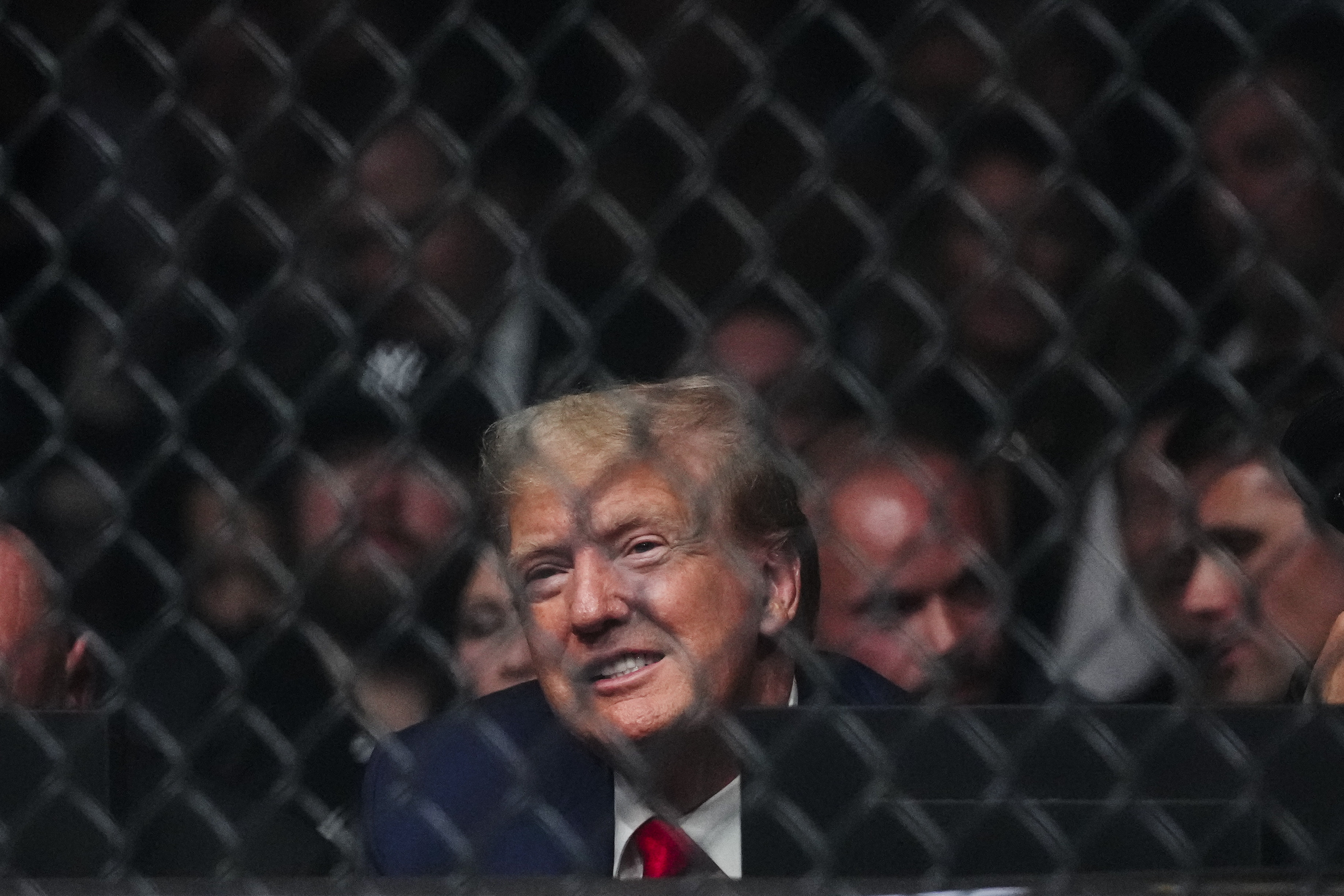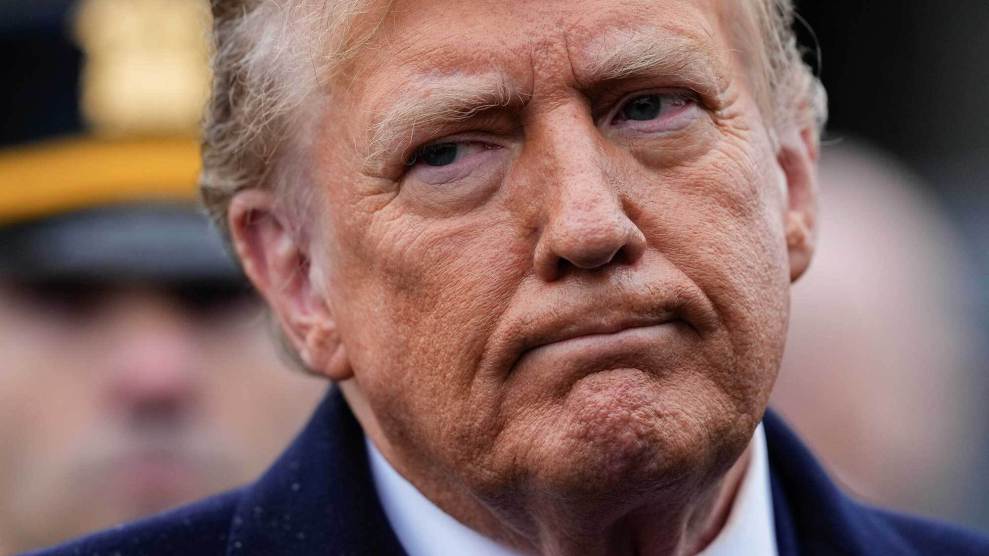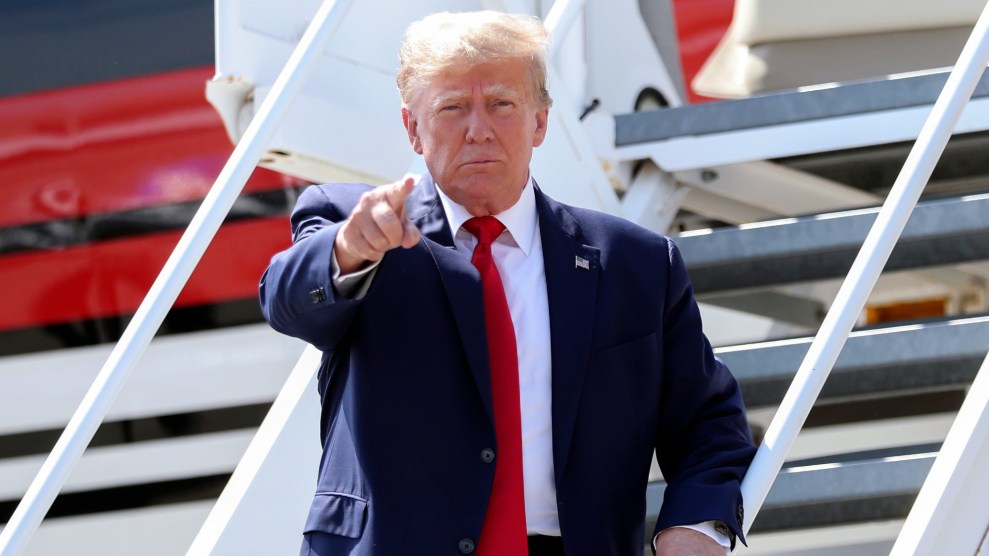In late February, after Donald Trump had nearly vanquished the entirety of the Republican primary field, his spokesman, Steven Cheung, took aim at the one opponent still standing. “Birdbrain, are you a liar or just plain stupid?” he tweeted.
“Birdbrain” was, of course, Nikki Haley, the former governor of South Carolina and Trump’s ambassador to the United Nations, whose effrontery in not exiting the race made her a favored punching bag. But there were, and are, many other Cheung targets. “Chris Christie looks like a weak bitch,” he proclaimed after the former New Jersey governor expressed regret for endorsing Trump in 2016. Last month, Cheung posted on X a picture of Joe Biden standing at a podium. His caption, all uppercase: “HELP! MY DIAPER IS FULL!”
Cheung’s last job before entering Trumpworld may partially explain his coarseness: He was director of communications and public affairs for the Ultimate Fighting Championship, a brutal mix of wrestling, kickboxing, and Brazilian jiu-jitsu. It would be tempting to dismiss him as just a foul-mouthed bully, a staffer Trump latched onto because more respectable operatives wanted nothing to do with him.
But, dear readers, if there are any among you rooting for a second Trump term, I have good news for you—and for the rest, some not-so-good-news: Cheung is a pretty clever guy. His social media posts and public statements, unhinged as they may sound, are calculated to draw attention amid the clutter of the 24/7 news cycle and to project the machismo that satisfies his boss’s core supporters. He is disciplined and laser-focused on the mission: Elect Trump at all costs.

Steven Cheung with lawyer Alina Habba and an unidentified member of Donald Trump’s entourage on June 13, 2023, outside a federal courthouse in Miami, where Trump was appearing in the criminal case involving his hoarding of classified documents.
Alex Brandon/AP
More broadly, he is part of a Trump campaign—specifically, a comms operation—that is less chaotic and leaky, and far more professional, than the ones in 2016 and 2020. “There’s a calmness that Cheung brings to the communications shop that was missing in the last campaign,” Bryan Lanza, a GOP operative who has worked for Trump, told me. “He’s secure. He’s not there because he’s chasing celebrity or wants to come out with a job on TV.”
Politics has always been a rough sport, Lanza notes, but there used to be accepted terms of engagement, as in boxing, whose Marquess of Queensberry rules enforce at least a modicum of decency. “You’d never think of name-calling like that in the past. but this is the next evolution of staffers,” he says. “It’s an aggressive media style that is very cutting, very insulting. We are in a crass environment.”

Cheung, 41, is a first-generation American, a child of Chinese parents who emigrated in their early 20s—though his mother was raised in Japan—and wound up owning restaurants and investing in other small businesses. Physically imposing, he is a little over 6 feet tall and rotund, with a large, oblong head he shaves clean. He could be the henchman of a Hollywood supervillain. “I don’t think I’d challenge him to an arm-wrestling contest,” Jason Miller, a senior Trump strategist, told me. Lanza likens Cheung’s stature to a bear on the hunt: “He may appear to move slow, but you can feel him coming toward you.”
Cheung grew interested in politics as a young man when he began reading his hometown paper, the Sacramento Bee. His path into Trump’s orbit began with a series of campaign jobs after he graduated from California State University in Sacramento with a double major in political science and computer science. He interned for then-Gov. Arnold Schwarzenegger and worked in communications for candidates in California, Texas, and Nevada, before hooking on to John McCain’s 2008 presidential campaign, where his title was administration assistant.
A former high school football player, Cheung became a martial arts fan and dabbled in taekwondo and Muay Thai boxing. In 2013, he left politics to take a job with the UFC that represented a significant elevation in status. He was in charge of communications and worked closely with UFC president Dana White, a longtime Trump crony and big-time donor. At the organization’s Las Vegas headquarters, Cheung was regarded as a wordsmith. “He’s a sharp guy, and you could tell right away he was a good writer,” says Marc Ratner, the UFC’s vice president for regulatory affairs.
Ratner had joined the UFC after a long career in boxing, and Cheung considered him a mentor. “I knew he had aspirations to go further,” Ratner recalls. “Probably to do something in politics.” Indeed, as Republican candidates began coming forward to run in the 2016 presidential primaries, Cheung, eager to get back in the game, reached out to numerous campaigns. Some never bothered to get back to him. A couple offered volunteer positions.
But to the Trump campaign, which had a hard time attracting seasoned professionals, Cheung’s past political work—and perhaps even more so his role with the UFC—made him an ideal hire. He and Miller, a veteran Republican operative, had never met but they had friends in common. “He emailed me out of the blue: I see where you’ve joined the Trump campaign and I want to join the team,” Miller recalls. “I saw his resume and then called him up, hired him over the phone, and told him to meet us at the convention in Cleveland. And I put him to work. He never left the War Room and was an integral part of our success in 2016.” (Cheung would not agree to be quoted in this story.)
After Trump’s victory, Cheung followed him to Washington, but not, at first, in a central role. “He was a nobody. He did baby things. I never saw him giving ideas,” a White House aide from that time recalls. “He didn’t have an office in the West Wing. He was in the Executive Office Building across the street and he was one of those rapid-response guys. He sat in front of his computer all day long and sent out statements.”
Yet over time, as high-level staffers shuffled in and quickly out of Trump’s communications team—Sean Spicer, Anthony Scaramucci, and Hope Hicks, among others—Cheung became the White House director of rapid response. He took on bigger tasks, including leading the comms team working on Senate confirmation of Neil Gorsuch to the Supreme Court.
The former president is a more recent fan of the UFC. After Trump left office, he and Cheung attended bouts together in Las Vegas. As recently as March, Trump, with daughter Ivanka and her husband, Jared Kushner, in tow, attended a UFC event in Miami. The arena’s sound system blasted Kid Rock’s “American Bad Ass” and a crowd of 19,000 roared as the Jumbotron showed the former president walking to his ringside seat.
The sensibility on display was one shared by Trump and Cheung—and also, importantly, by a political demographic Trump covets. Market research indicates that men constitute up to 90 percent of mixed martial arts fans and that Black and Hispanic men are substantially overrepresented. (According to a recent study, about 25 percent of African Americans and 22 percent of Hispanics identify as viewers, compared with 15 percent of white Americans.)
Recent polling shows Trump gaining support with these groups, a nightmare scenario for Democrats. The pugilistic language Cheung deploys on Trump’s behalf is unlikely to appeal to suburban white women, but it’s dead-center on the young-male UFC frequency.
Broke dick press conference by @BidenHQ with only 59 people watching. pic.twitter.com/yAv5fHrRJ5
— Steven Cheung (@TheStevenCheung) April 1, 2024
It also hits home with the constituency of one that everyone in Trumpworld must stroke: Trump himself.
The former president casts his entourage based on loyalty, but also appearance. The women in his inner circle tend to have long hair, often blonde, with the manicured appearance of Fox News anchors. Cheung fits a different one of Trump’s favored personas: the enforcer. His look, the UFC pedigree, and the language he uses all fit the part: Tangle with the boss, and you’ll get a knee in the head from Cheung.
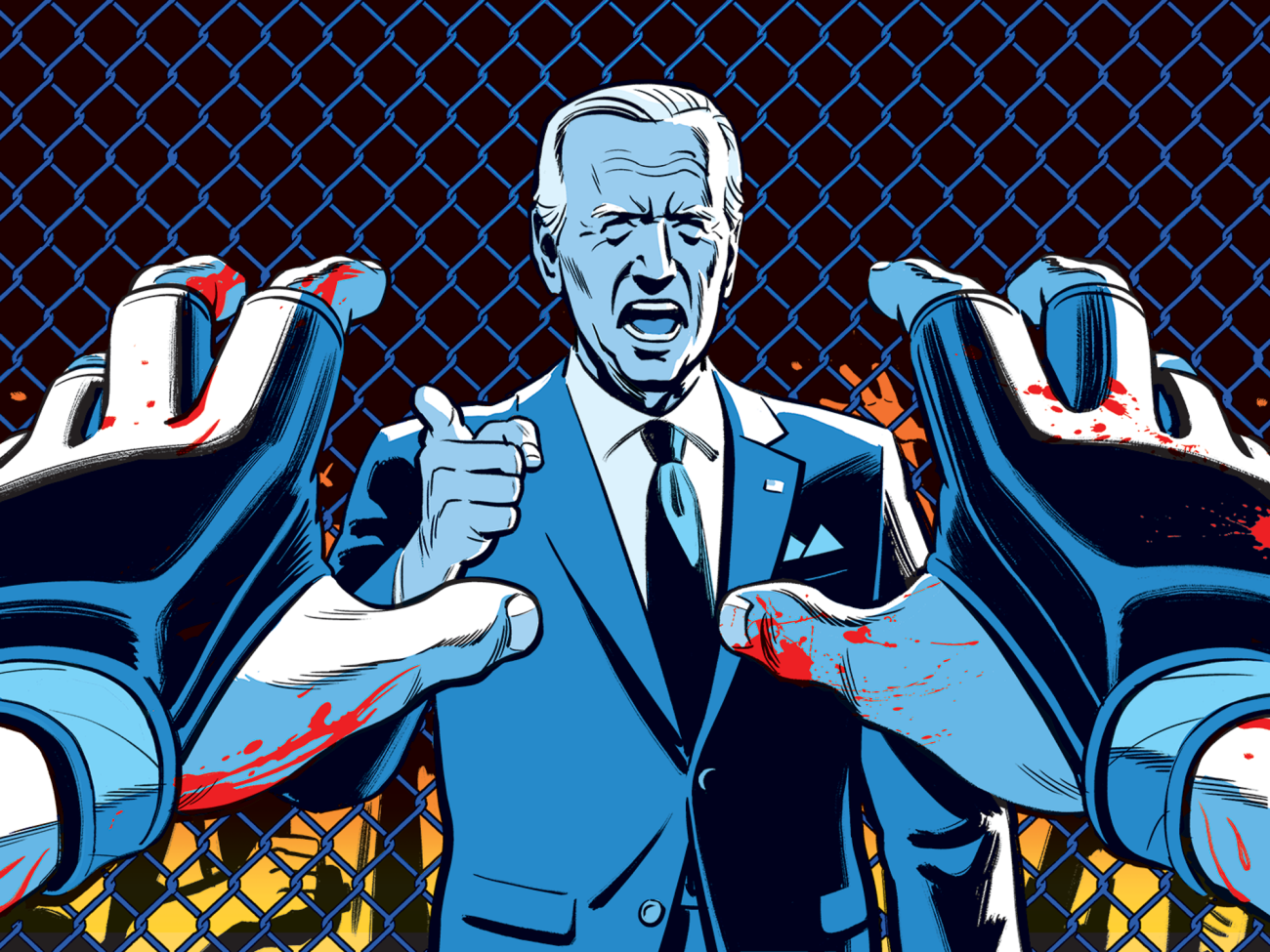

Cheung stayed on until the end of the Trump presidency, consulting for a few campaigns during the 2022 cycle before returning to the fold. He deepened his bond with Trump in the wake of his boss’s first federal indictment—the classified documents case. With further indictments looming, Trump convened a meeting of his top advisers at Mar-a-Lago. One by one, he asked them what they thought the impact would be.
As it was recounted to me, the atmosphere in the room was grave. But when Cheung’s turn came, he told Trump he thought the indictments would give him a bump in the polls of five or six points—which it did—and Trump didn’t forget it.
Dumb and Dumber… and Dumbest. pic.twitter.com/SqgkT3MvNe
— Steven Cheung (@TheStevenCheung) March 28, 2024
In one way, at least, Cheung plays a traditional role in a wholly untraditional campaign. He’s a main point of contact for journalists covering Trump, responds to their questions, and can parcel out coveted access—a seat on the campaign plane, an invite to a Mar-a-Lago event.
I interviewed several journalists who cover Trump, all of whom asked not to be quoted by name because they deal with Cheung on a regular basis. They all gave the spokesman relatively high marks. “This is the most functional version of a press operation, by far, that Trump has had,” one reporter told me. “The bar isn’t super high. But this is a normal operation where people stay in their lanes and do what they’re supposed to. For better or worse, they do not leak a lot of stuff.”
“In a world populated by liars, I am not aware that he’s ever knowingly lied to me,” says another. “There’s probably been a shading of facts, or spin, but that’s within the realm of what’s expected.”
The critical coverage that sends conventional campaigns into damage-control mode is tolerated and even appreciated in Trumpworld, so long as it feeds the MAGA base. “The stories you used to think are going to be negative for them, or scandalous—like that Trump’s going to root out the deep state and fire thousands of civil servants or round up migrants and put them in camps on military bases—they don’t give two shits about,” another journalist told me. “They don’t push back, because these are messages they are happy to drive.”
Cheung has never been married, and, according to colleagues, he is completely devoted to his work. He works long hours, texting with reporters as early as 6 a.m. and sometimes responding to their queries until past midnight. He is low drama even in fraught moments. “You might hear him quietly say, ‘Oh boy,’” Lanza says. “He closes his eyes, then 30 seconds later, he’s on it. That’s as animated as he gets.”

Cheung’s behind-the-scenes interactions with the press corps may fall within normal boundaries, but the words he projects into the political universe certainly do not.
In boxing, you can’t hit an opponent who has fallen to the mat. In the UFC, however, fighters routinely stand over a fallen foe and pummel them. This is one of Cheung’s specialties. Just before Super Tuesday, when it was clear Haley probably had no way forward, Cheung tweeted, “The Nikki Haley candidacy is just one giant masturbatory fantasy for Never Trumpers and Democrats.”
He echoes Trump’s signature dialect of invective, sexual emasculation, and misogyny. “Baby girl, who hurt you,” he tweeted at Christina Pushaw, a spokeswoman for Ron DeSantis. “You sure seem obsessed with me. But I can’t blame ya.”
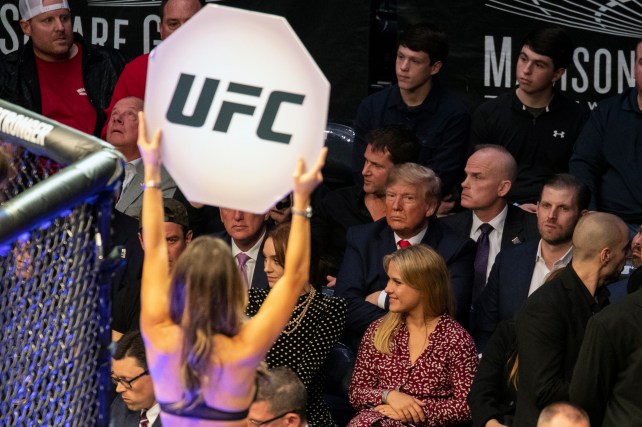
Trump and his entourage at a UFC bout in New York City, November 2, 2019.
Evan Vucci/AP
The press struggles to characterize these statements. After he declared Christie a “weak bitch,” Politico published the quote, noting that Cheung “didn’t mince words”—which is one way of putting it.
“When Trump was president, some of us dealt with the media in a somewhat traditional way,” recalls the former White House aide. “We dealt with fact patterns and tried to counter what we believed was inaccurate. This group is not trying to manage the press in any real way. They just send out these blistering, hilarious statements.”
“Cheung’s like a MAGA version of Jerry Seinfeld, where he says what other people would want to say,” he adds. “Comms people sometimes joke about statements they’d like to put out but never would. But what this guy does is actually put those statements out there. It’s insane.”
Everything Cheung does is “performative,” claims a staffer for a rival GOP candidate who saw him in action on the campaign trail. He bashes the mainstream press, but then “he’s getting cappuccinos with them in the morning,” the staffer told me. “He wants Daddy to like him.”
Cheung’s personal beliefs are hard to pinpoint. But after Trump took him in when other candidates would not, he became a disciple.
“I don’t know that he’s a true believer in any particular Trump policy,” one of the journalists on the campaign trail told me. “When you’re Trump’s flack, you have to message a bunch of psychotic things. I’m pretty sure Steven Cheung knows the election wasn’t stolen, but he’s not going to ever say that. Which is worse? Believing the crazy stuff or knowing it’s wrong but messaging it anyway? I don’t know. It’s an existential question.”
When Trump says something that is transparently ugly and hateful even by his own standards, it falls to Cheung to defend him. But in doing so, Cheung often ventures well beyond the borders of political spin and into the realm of absurdity. In early March, Trump warned that some migrants crossing the border are speaking “languages that nobody in this country has ever heard of.” When asked about this, Cheung replied, “There are migrants invading from countries that we know nothing about, which is the point.”
That clearly wasn’t Trump’s point, and Cheung’s statement was ridiculous on its face. There aren’t any countries the US government knows nothing about—and we know a lot about those from which large numbers of migrants originate.
This past Veterans Day, to offer another example, Trump pledged that he’d root out all the “communists, Marxists, fascists, and the radical left thugs that live like vermin within the confines of our country that lie and steal and cheat on elections.” When historians pointed out that the former president had attached a Nazi trope—vermin—to his election lie, Cheung panned any critics as “snowflakes” suffering from “Trump Derangement Syndrome,” adding that “their entire existence will be crushed when President Trump returns to the White House.” (He later clarified that he’d meant to say their “sad, miserable existence.”)
After Trump was criticized for proclaiming that immigrants are “poisoning the blood” of America, Cheung insisted that this is “a normal phrase that is used in everyday life.”
Spicer, Trump’s first press secretary, who keeps in touch with some of the current campaign staffers, described Cheung as being within “a small circle of trust,” one notch below senior advisers Susie Wiles, Chris LaCivita, and Jason Miller in the hierarchy. Cheung rarely does television appearances, and seems ill at ease on camera, so he is unlikely to be the face at the White House press podium during a second Trump administration. He would more likely play a senior communications role, setting strategy and tone—and would almost certainly run a tight ship.
But history teaches that efficiency in the service of evil is not to be admired or celebrated. Once you start characterizing people as vermin, it is reasonable to question what you might do to them. The most pressing question about Cheung could be asked of anyone in Trump’s inner circle: What measures would he not defend? What would he not message? Does Cheung, whose parents assuredly did not poison the nation’s bloodstream, have any red lines?
The professionalization of Trumpworld that Cheung personifies is a danger all its own. It masks what is otherwise entirely abnormal. Cheung may be a tolerably decent guy on a personal level, but he willingly, even gleefully, represents an indecent cause. And he’s good at it. He is, as one DC reporter put it to me, “the platonic ideal of a Trump spokesman.”
Top image: Mother Jones illustration; Jabin Botsford/The Washington Post/Getty; Lev Radin/ZUMA

